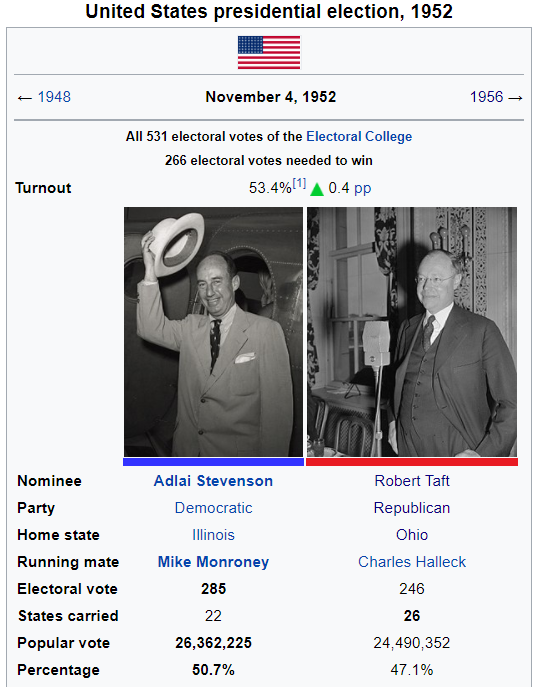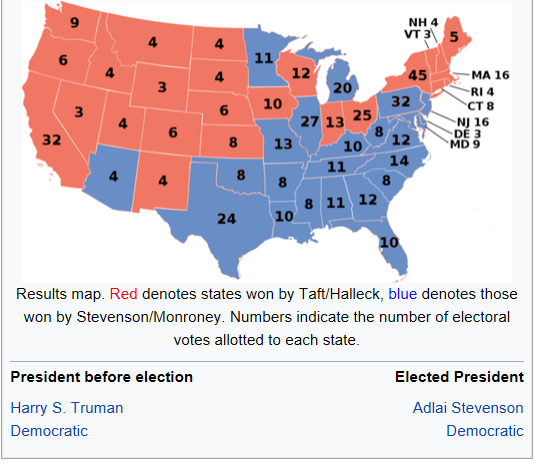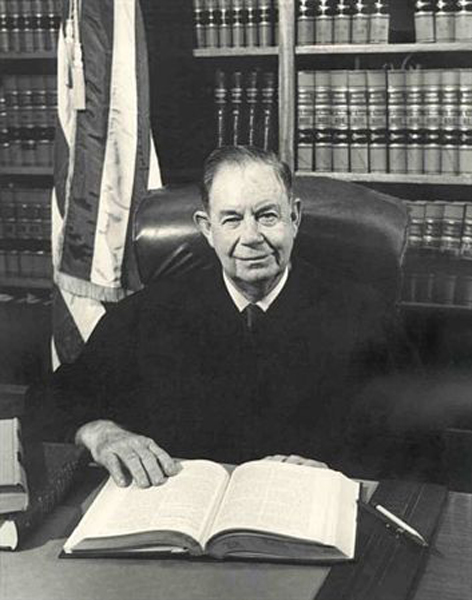Update 1: 1952 Election
Gentleman Biaggi
Banned
“McCarthyism, Nukes, and integration, that’s what’s at stake.”
*Audible sigh*
“At least it’s better than 1932”
“You say that every year”
-Conversation between Earl Warren andMargaret Chase Smith November 3, 1952
General Dwight D. Eisenhower’s announcement that he wasn’t going to run for president in 1952 sent waves through the Republican Party. Several Moderates and Liberals in the Republican Party tried to get Eisenhower to run, mainly because he’d be an effective resource in defeating the popular Robert Taft. When he announced that he wasn’t going to run, Taft’s nomination was all but secured. Liberal Republicans then tried to get popular Liberal Republicans like Thomas Dewey or even Wendell Willkie to run, just to stop Taft. In the end, only Earl Warren and Harold Stassen ran as Liberal/Moderate Republicans. Neither were successful in defeating Taft.
While the Liberal and Moderate Republicanswere unable to defeat Taft they were able to defeat his first choice for running mate. Taft originally wanted to choose Douglas MacArthur as his running mate, but a coalition of big-name Liberal and Moderate Republicans including Earl Warren, Wayne Morse, Margaret Chase Smith, Harold Stassen, Merlin Hull, Philip Willkie, Thomas Dewey, and the La Follette brothers stopped him. MacArthur’s support for McCarthyism, his conservatism, his feud with Truman, and the general conservatism of the potential ticket caused much controversy with moderates. After the moderate/liberal faction blocked MacArthur Taft decided to nominate Charles Halleck and he was accepted.
Meanwhile, the Democratic Party was having a nomination process of its own, despite the intense media attention on the Republicans. Originally Estes Kefauver was favored due to his domination of the Democratic Primaries. However, reformist and popular governor of Illinois Adlai Stevenson announced his candidacy. Stevenson won after three ballots due to support from all kinds of well-known Democrats. Stevenson was moderately sure that he’d win the south due to support from politicians like John Sparkman and Richard Russell. So, he decided to branch out and choose a less well-known running mate. In the end he chose Mike Monroney, in hopes that he’d appeal to more western areas of the south.
The election was extremely hard-fought. Stevenson attacked Taft on his isolationism (calling him “as dangerous as Henry Wallace”), support for McCarthy (although he did say he opposed Communism), and conservative economic views. Taft fired back, but it was clear that he was losing ground in the polls. In fact, many said that the only thing keeping Taft ahead was personal popularity, and even then things didn’t look so good. This was mainly due to Taft’s isolationism, which was growing very unpopular.


While Stevenson still won, it was by less than what polls expected. Most polls expected him to win Massachusetts, and some expected a New York or Rhode Island win. However, little campaigning in the Northeast caused him to lose all three. While Stevenson’s win was less than expected, it was still a win, and the Democrats prepared themselves for four more years.
------------------------------------------
Pre-TL notes
1. I will only be posting on Saturdays, since I have quite the busy schedule
2. Thanks to @gap80 for his assistance, without him, this TL would be 200% worse
*Audible sigh*
“At least it’s better than 1932”
“You say that every year”
-Conversation between Earl Warren andMargaret Chase Smith November 3, 1952
General Dwight D. Eisenhower’s announcement that he wasn’t going to run for president in 1952 sent waves through the Republican Party. Several Moderates and Liberals in the Republican Party tried to get Eisenhower to run, mainly because he’d be an effective resource in defeating the popular Robert Taft. When he announced that he wasn’t going to run, Taft’s nomination was all but secured. Liberal Republicans then tried to get popular Liberal Republicans like Thomas Dewey or even Wendell Willkie to run, just to stop Taft. In the end, only Earl Warren and Harold Stassen ran as Liberal/Moderate Republicans. Neither were successful in defeating Taft.
While the Liberal and Moderate Republicanswere unable to defeat Taft they were able to defeat his first choice for running mate. Taft originally wanted to choose Douglas MacArthur as his running mate, but a coalition of big-name Liberal and Moderate Republicans including Earl Warren, Wayne Morse, Margaret Chase Smith, Harold Stassen, Merlin Hull, Philip Willkie, Thomas Dewey, and the La Follette brothers stopped him. MacArthur’s support for McCarthyism, his conservatism, his feud with Truman, and the general conservatism of the potential ticket caused much controversy with moderates. After the moderate/liberal faction blocked MacArthur Taft decided to nominate Charles Halleck and he was accepted.
Meanwhile, the Democratic Party was having a nomination process of its own, despite the intense media attention on the Republicans. Originally Estes Kefauver was favored due to his domination of the Democratic Primaries. However, reformist and popular governor of Illinois Adlai Stevenson announced his candidacy. Stevenson won after three ballots due to support from all kinds of well-known Democrats. Stevenson was moderately sure that he’d win the south due to support from politicians like John Sparkman and Richard Russell. So, he decided to branch out and choose a less well-known running mate. In the end he chose Mike Monroney, in hopes that he’d appeal to more western areas of the south.
The election was extremely hard-fought. Stevenson attacked Taft on his isolationism (calling him “as dangerous as Henry Wallace”), support for McCarthy (although he did say he opposed Communism), and conservative economic views. Taft fired back, but it was clear that he was losing ground in the polls. In fact, many said that the only thing keeping Taft ahead was personal popularity, and even then things didn’t look so good. This was mainly due to Taft’s isolationism, which was growing very unpopular.
While Stevenson still won, it was by less than what polls expected. Most polls expected him to win Massachusetts, and some expected a New York or Rhode Island win. However, little campaigning in the Northeast caused him to lose all three. While Stevenson’s win was less than expected, it was still a win, and the Democrats prepared themselves for four more years.
------------------------------------------
Pre-TL notes
1. I will only be posting on Saturdays, since I have quite the busy schedule
2. Thanks to @gap80 for his assistance, without him, this TL would be 200% worse
Last edited:
